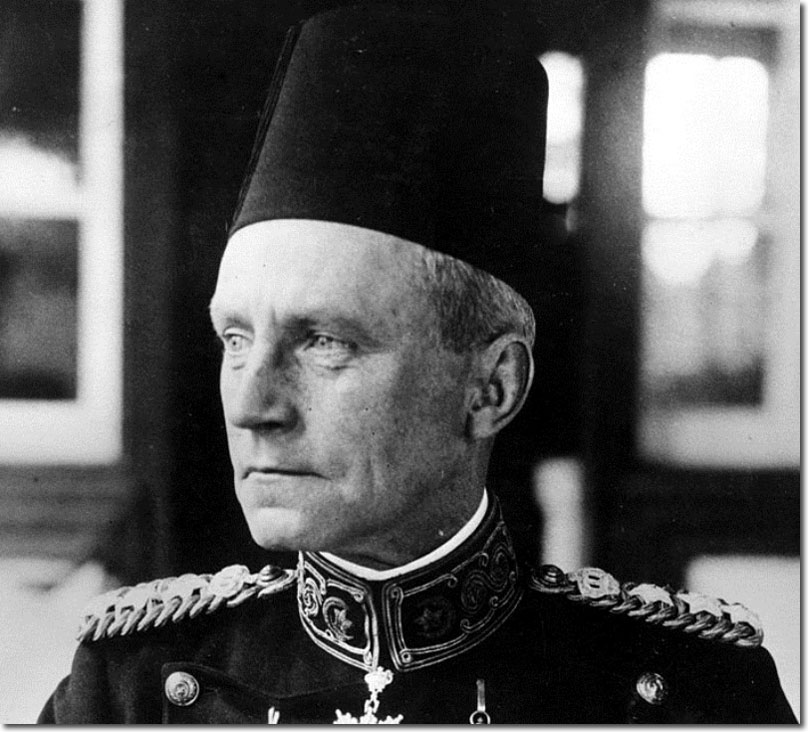|
|


|
|
Sir Thomas Wentworth Russell was a police officer in the Egyptian service. He was invited to visit Cairo by Percy Machell, a distant cousin, then adviser to the Egyptian minister of the interior. He came home to graduate and then entered the Egyptian service in October 1902.
After apprenticeship with the Alexandria coastguards Russell was appointed provincial sub-inspector in January 1903 and served, later as inspector, in every Egyptian province, thus acquiring unrivalled knowledge of local officials, while directing police activities which ranged from coping with the consequences of Nile floods and plague epidemics to pitched battles against Bedouin brigands; their depredations were virtually eliminated by the police camel corps formed on Russell's initiative in 1906. In 1911 he was appointed assistant commandant of police in Alexandria where he enjoyed a foretaste of dealing with city demonstrations, ‘sporting evenings’ raiding gambling dens, and an interlude in command of western desert anti-contraband operations. He was transferred to Cairo as assistant commandant in 1913. In 1917, following a line of British notables, Russell was appointed commandant of the Cairo city police with rank of lewa (major-general) and title of pasha. By then Egypt was a British protectorate; under war stress British power, far from withering away, was everywhere in irritating evidence; smouldering Egyptian resentment, fully comprehensible to ‘Russell Pasha’, flared into violence in March 1919; a clash between hysterical mobs determined to demonstrate and British troops committed to enforce a ban seemed inevitable; but, thanks to Russell's inspired intervention, the demonstrations were converted into orderly processions which he led through Cairo streets, standing in an open car or on foot, with a pause for brandy-and-soda at the Turf Club. After Egyptian independence in 1922 Russell served under twenty-nine different ministers of interior; opposition leaders were government quarry, but, by adroit manoeuvre combined with personal charm, he mitigated the violence of internecine political warfare, notably in 1932 when, reducing crisis to comedy, he avoided using force against the entire shadow cabinet of the Wafd party. While retaining the esteem of most politicians, he deplored their quarrels, which seemed, in his perhaps over-simplified view, to hamper the real progress of a nation he loved. Russell's own talents were increasingly diverted to the scourge of growing drug addiction. He pressed evidence on the prime minister, and in 1929 the Egyptian Central Narcotics Intelligence Bureau was formed. As director, operating with small capital resources and hereditary enthusiasm, he hunted the sources of supply; tracks led to Switzerland, France, Bulgaria, Turkey, and Greece. At Geneva he bluntly presented his findings. Moral pressure, backed by incontrovertible evidence, was so effective that by 1939, when he was elected vice-president of the League of Nations advisory committee on opium traffic, most European bases of supply were destroyed. In 1940 Cairo again became the pivot of British military operations. Egyptian police discipline, buttressed by Russell's presence, held firm under strain; co-operation with the visiting army was close, surviving even the use of British tanks to compel King Farouk to change his ministers in February 1942, a controversial expedient that pained and surprised Russell. In 1946, still popular, he retired, the last British officer in Egyptian service. He was appointed OBE in 1920, CMG in 1926, and KBE in 1938. He also held numerous foreign decorations. Amid the conflict of Egyptian nationalism, British exigencies, and European minority pretensions, Russell remained an impartial guardian of law and order, justly renowned for professional expertise. Although political assassinations were all too prevalent, the murderers rarely contrived to escape. He was a remarkable and solicitous police chief, a link in the best British tradition with Egypt, and, by his campaign to suppress drug traffic, a pioneer in an important international cause. In 1911 Russell married Evelyn Dorothea Temple, daughter of Francis Moore, stockjobber. They had one son, Sir John Wriothesley Russell, who became ambassador to Spain in 1969, and one daughter, Camilla Georgiana, who married the author of the Palestine: Britain's Crown of Thorns; Christopher Sykes. Tall and commanding, a sportsman, a dandy, a horseman who made history by riding his camel over fences, as much at ease in his wife's salon as in any desert company, ready for any discomfort on an ibex trail but a bon viveur in town, finding humour in everything and friends everywhere, Russell was a legend in his lifetime. Some of the flavour was happily preserved in his own published reminiscences, Egyptian Service (1949). He died at Fitzroy House, 16 Fitzroy Square, London, on 10 April 1954. |
Armed Forces | Art and Culture | Articles | Biographies | Colonies | Discussion | Glossary | Home | Library | Links | Map Room | Sources and Media | Science and Technology | Search | Student Zone | Timelines | TV & Film | Wargames